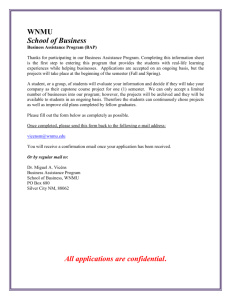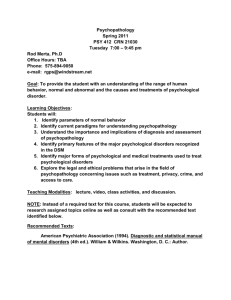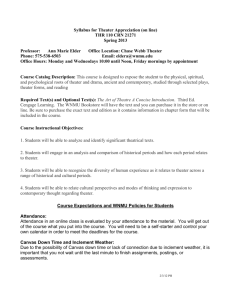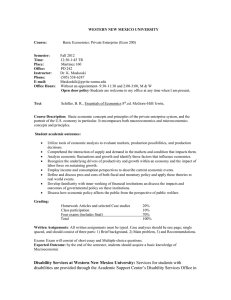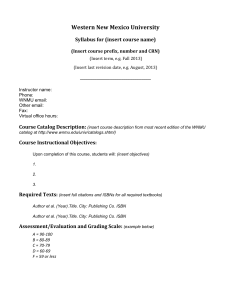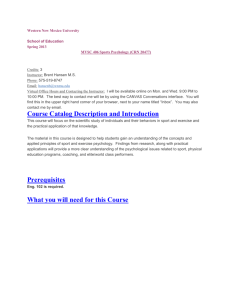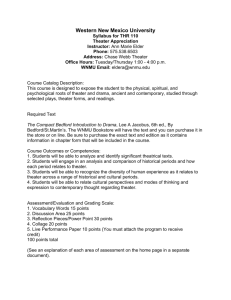SWK 320 CRN 30132 - Western New Mexico University
advertisement
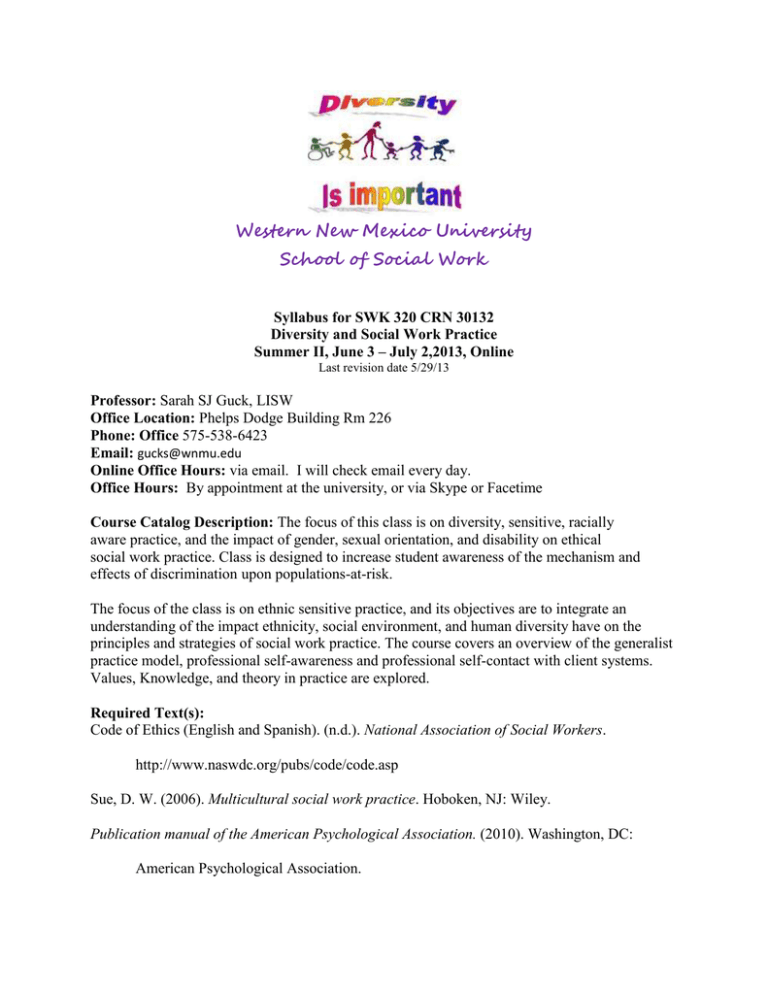
Western New Mexico University School of Social Work Syllabus for SWK 320 CRN 30132 Diversity and Social Work Practice Summer II, June 3 – July 2,2013, Online Last revision date 5/29/13 Professor: Sarah SJ Guck, LISW Office Location: Phelps Dodge Building Rm 226 Phone: Office 575-538-6423 Email: gucks@wnmu.edu Online Office Hours: via email. I will check email every day. Office Hours: By appointment at the university, or via Skype or Facetime Course Catalog Description: The focus of this class is on diversity, sensitive, racially aware practice, and the impact of gender, sexual orientation, and disability on ethical social work practice. Class is designed to increase student awareness of the mechanism and effects of discrimination upon populations-at-risk. The focus of the class is on ethnic sensitive practice, and its objectives are to integrate an understanding of the impact ethnicity, social environment, and human diversity have on the principles and strategies of social work practice. The course covers an overview of the generalist practice model, professional self-awareness and professional self-contact with client systems. Values, Knowledge, and theory in practice are explored. Required Text(s): Code of Ethics (English and Spanish). (n.d.). National Association of Social Workers. http://www.naswdc.org/pubs/code/code.asp Sue, D. W. (2006). Multicultural social work practice. Hoboken, NJ: Wiley. Publication manual of the American Psychological Association. (2010). Washington, DC: American Psychological Association. 2 Course Instructional Objectives: Upon completion of this course, student will be able to: 1. Demonstrate that they understand the differential designation of the term minority, realizing that the term minority differs depending on time and place. 2. Demonstrate that they have explored their own values regarding his/her belief system about individuals having a different race, color, gender, age, generation, creed, ethnic or national origin, class, disability, political or sexual orientation from his or her own. The student will develop the ability to be open and understand the effect of his/her own cultural differences and similarities in experiences, needs and beliefs on his/her social work practice. 3. Demonstrate that they have explored the differences in values, beliefs and actions that arise in working with individuals from a different race, color, gender age, generation, creed, ethnic or national origin, class, physical or mental ability, sexual or political orientation. The student also will develop an eagerness to understand those from different backgrounds, and place him/herself within the context of differing beliefs. 4. Demonstrate that they have developed the tools to understand how to learn about different racial, color, gender, age, generational, creed, ethnic or national origin, class, physical or mental ability or sexual or political orientation. 5. Demonstrate that they can identify, understand, and be willing to work with individuals, families, groups, social networks, organizations and communities that have incorporated differences in values and beliefs whose origins may arise from differences in race, color, gender, age, generation, creed, ethnic or national origin, class, or those with a different physical or mental ability or those having a different sexual or political orientation. 6. Demonstrate that they have the ability to apply above material to accurately assess, implement, and evaluate social work practice with those of differing backgrounds and with the community at large. 7. Demonstrate that they have developed an appreciation for, and be willing to celebrate, difference in race, color, gender, age, generational, creed, ethnic or national origin, class, physical or mental ability or sexual or political orientation. 8. Demonstrate that they have developed the ability to address discrimination, economic deprivation, and oppression personally and within an organizational context. Grading Scale A = 90-100 B = 80-89 C = 70-79 D = 60-69 F = 59 or less Course Expectations and WNMU Policies for Students Attendance: Attendance in an online class is evaluated by your attendance to the material. You will get out of the course what you put into the course. You will need to be a self-starter and control your own calendar in order to meet the deadlines for the course. For online courses, if you have not logged into class after the 3rd day of class, I must report it to administration. 3 Canvas Down Time and Inclement Weather: Due to the possibility of Canvas down time or lack of connection due to inclement weather, it is important that you not wait until the last minute to finish assignments, postings, or assessments. Posting Assignments and Discussions: Students are responsible for posting all discussions on the Discussion Board and all assignments to the Assignments posting area. If you are having difficulty with this, it is your responsibility to contact the instructor so that s/he can get you the assistance you need to learn how to do this. Assignments and Due Dates: Please read the syllabus carefully, and keep up to date via your Canvas page regarding due dates and submission requirements for each assignment. Consent: Some individuals may choose to disclose personal information during class. Therefore, it is important that all classmates agree not to discuss or write about what others have discussed in class. Professionalism: Students are learning professional skills and are expected to engage in class discussions, complete reading assignments, and meet deadlines as befits professional behavior. Scholarly Writing: Use clear college-level writing with correct spelling and grammar for all assignments. If you need help with your writing consult a Smarthinking writing tutor at http://www.wnmu.edu/univ/smarthinkins.shtml. Communications policy statement regarding official e-mail: WNMUs policy requires that all official communication with the University, other than your inclass Canvas communications, be sent via Mustang Express. Emails sent to you by various WNMU departments related to your registration, financial account balance, changes in schedule, etc., will be sent to your wnmu.edu email address. It is very important that you access your Mustang Express email periodically to check for correspondence from the University. If you receive most of your email at a different address, you can forward your messages from Mustang Express to your personal address. To forward your WNMU e-mail to a personal e-mail address: 1. Log in to Mustang Express. 2. From the My E-mail Inbox in the center of the screen, select the small E-mail hyperlink (beside the envelope icon). 3. Select Options. 4. Select Settings. 5. Below Mail Forwarding at the bottom of the screen, type in your personal e-mail address. 6. Select Save Settings. WNMU policy on email passwords: WNMU requires that passwords for access to all protected software, programs, and applications be robust, including complexity in the number of characters required, the combination of characters required, and the frequency in which passwords are required to be changed. Minimum complexity includes: Passwords shall contain at least six (6) characters Passwords shall contain at least one capital (upper case) letter, and at least one numeral. Passwords shall be changed at least every 90 days 4 Academic Integrity: Each student shall observe standards of honesty and integrity in academic work as defined in the WNMU catalog. Violations of academic integrity include any behavior that misrepresents or falsifies a student’s knowledge, skills or ability with the goal of unjustified or illegitimate evaluation or gain. Generally violations of academic integrity include cheating and plagiarism. Refer to the WNMU catalog for definitions. Penalties for infractions are as follows: For Plagiarism: Intentional or unintentional representation of another’s work as one’s own without proper acknowledgement of the original author or creator of the work: Instructor inserts penalties (example below): 1st infraction: Grade of 0 for assignment; 2nd infraction: Dismissal from the class with grade of F. For Cheating: Using or attempting to use unauthorized materials and unauthorized collaboration with others, copying the work of another or any action that presents the work of others to misrepresent the student’s knowledge: Instructor inserts penalties (example below): 1st infraction: Dismissal from class with grade of F. Integrated Use of Technology: You will be using Canvas to post discussions, post assignments, and take all quizzes and exams. You will need to learn how to attach and submit documents if you don’t already know how to do this. Disability Support Services: Services for students with disabilities are provided through the Student Health Center’s Disability Support Services office. Some examples of the assistance provided are audio materials for the blind or dyslexic, note takers, readers, audio recorders, and special tutors. In order to qualify for these services, documentation must be provided by certified health care professionals. Disability Support Services information and forms are available by calling 575.538.6400 or emailing dss@wnmu.edu. The Disability Support Services office serves as Western New Mexico University's liaison for students with disabilities. Need Help? Post your question to the Discussion Board in your online course. Send a question via Canvas email to your instructor. For 24/7 Canvas Help call: 888.332.6994 Contact the WNMU Help Desk at helpdesk@wnmu.edu or 575.574.4357. Register for IPS 010, Canvas Orientation. This is a short, free, non-credit introduction to Canvas; no textbook is required. Once you complete the orientation activities, you can re-enter the course at any time during the semester to get additional help from the instructor as needed. Consult Student Online Resources at http://learn.wnmu.edu/support/resstu.shtml for an online readiness assessment, Technical Requirements, Canvas tutorials and Canvas Student Guide. Course Access: Access to online course materials will be available to students between the start and end dates listed in the class schedule. Copyright: 5 The materials found in this course are only for the use of students enrolled in this course for purposes associated with this course and may not be retained by students in any electronic form or further disseminated or distributed to anyone not enrolled in this course. Code of Civility In order to promote a positive, professional atmosphere among students, faculty and staff, the following Code of Civility has been developed: Respect: Treat all students, faculty, staff and property with respect and in a courteous and professional manner. This includes all communications, whether verbal or written. Let your actions reflect pride in yourself, your university, and your profession. Kindness: A kind word and gentle voice go a long way. Refrain from using profanity, insulting slang remarks, or making disparaging comments. Consider another person’s feelings. Be nice. Truth: Exhibit honesty and integrity in your dealings with fellow students, faculty and staff members. Don’t lie, don’t cheat, and don’t steal. Responsibility: Take responsibility for your actions. This includes gracefully accepting the consequences of your behavior. Cooperation: Exhibit a cooperative manner when dealing with students, faculty and staff so we may all work towards our common goals and mission. Acceptance: Accept differences in others, as they accept differences in you. This includes diversity in opinions, beliefs and ideas and everything else that makes us unique individuals. Professionalism: Always conduct yourself in a manner that will bring pride to your profession, to Western New Mexico University, and, most importantly, to yourself. The Council of Social Work Education upholds that all social work education should include the following core competencies. Each of the core competencies encompasses individual necessary knowledge, values, skills, and operational practice behaviors. Each student should be familiar with these core competencies, and be able to demonstrate knowledge of them at the completion of this course. CSWE EPAS 2008 Core Competencies Professional Identity 2.1.1 Identify as a professional social worker and conduct oneself accordingly. Necessary Knowledge, Values, & Skills Social workers serve as representatives of the profession, its mission, and its core values. Social workers know the profession’s history. Social workers commit themselves to the profession’s enhancement and to their own professional conduct and growth. Operational Practice Behaviors a) Social workers advocate for client access to the services of social work; b) Social workers practice personal reflection and self-correction to assure continual professional development; c) Social workers attend to professional roles and boundaries; d) Social workers demonstrate professional demeanor in behavior, appearance, and communication; e) Social workers engage in career-long learning; and f) Social workers use supervision and consultation. Ethical Practice 2.1.2 Apply social work ethical principles to guide professional practice. 6 Necessary Knowledge, values & Skills Social workers have an obligation to conduct themselves ethically and engage in ethical decision making. Social workers are knowledgeable about the value base of the profession, its ethical standards, and relevant law. Operational Practice Behaviors a) Social workers recognize and manage personal values in a way that allows professional values to guide practice; b) Social workers make ethical decisions by applying standards of the National Association of Social Workers Code of Ethics and, as applicable, of the International Federation of Social Workers/International Association of Schools of Social Work Ethics in Social Work, Statement of Principles; c) Social workers tolerate ambiguity in resolving ethical conflicts; and d) Social workers apply strategies of ethical reasoning to arrive at principled decisions. Critical Thinking 2.1.3 Apply critical thinking to inform and communicate professional judgments. Necessary Knowledge, Values, & Skills Social workers are knowledgeable about the principles of logic, scientific inquiry, and reasoned discernment. They use critical thinking augmented by creativity and curiosity. Critical thinking also requires the synthesis and communication of relevant information. Operational Practice Behaviors a) Social workers distinguish, appraise, and integrate multiple sources of knowledge, including researchbased knowledge, and practice wisdom; b) Social workers analyze models of assessment, prevention, intervention, and evaluation; and c) Social workers demonstrate effective oral and written communication in working with individuals, families, groups, organizations, communities, and colleagues. Diversity in Practice 2.1.4 Engage diversity and difference in practice. Necessary Knowledge, Values, & Skills Social workers understand how diversity characterizes and shapes the human experience and is critical to the formation of identity. The dimensions of diversity are understood as the intersectionality of multiple factors including age, class, color, culture, disability, ethnicity, gender, gender identity and expression, immigration status, political ideaology, race, religion, sex, and sexual orientation. Social workers appreciate that, as a consequence of difference, a person’s life experiences may include oppression, poverty, marginalization, and alientation as well as privilege, power, and acclaim. Operational Practice Behaviors Social workers recognize the extent to which a culture’s structures and values may oppress, marginalize, alienate, or create or enhance privilege and power; b) Social workers gain sufficient self-awareness to eliminate the influence of personal biases and values in working with diverse groups; c) Social workers recognize and communicate their understanding of the importance of difference in hsaping life experiences; and d) Social workers view themselves as learners and engage those with whom they work as informants. a) Human Rights & Justice 7 2.1.5 Advance human rights and social and economic justice. Necessary Knowledge, Values, & Skills Each person, regardless of position in society, has basic human rights, such as freedom, safety, privacy, an adequate standard of living, health care, and education. Social workers recognize the global interconnection of oppression and are knowledgeable about theories of justice and strategies to promote human and civil rights. Social work incorporates social justice practices in organizations, institutions, and society to ensure that these basic human rights are distributed equitably and without prejudice. Operational Practice Behaviors a) Social workers understand the forms and mechanisms of oppression and discrimination; b) Social workers advocate for human rights and social and economic justice; and c) Social workers engage in practices that advance social and economic justice. Research Based Practice 2.1.6 Engage in research-informed practice and practice-informed research. Necessary Knowledge, Values, & Skills Social workers use practice experience to inform research, employ evidence-based interventions, evaluate their own practice, and use research findings to improve practice, policy, and social service delivery. Social workers comprehend quantitative and qualitative research and understand scientific and ethical approaches to building knowledge. Operational Practice Behaviors a) Social workers use practice experience to inform scientific inquiry; and b) Social workers use research evidence to inform practice. Human Behavior 2.1.7 Apply knowledge of human behavior and the social environment. Necessary Knowledge, Values, & Skills Social workers are knowledgeable about human behavior across the life course; the range of social systems in which people live; and the ways social systems promote or deter people in maintaining or achieving health and well-being. Social workers apply theories and knowledge from the liberal arts to understand biological, social, cultural, psychological, and spiritual development. Operational Practice Behaviors a) Social workers utilize conceptual frameworks to guide the processes of assessment, intervention, and evaluation; and b) Social workers critique and apply knowledge to understand person and environment. Policy Practice 2.1.8 Engage in policy practice to advance social and economic well-being and to deliver effective social work services. Necessary Knowledge, Values, & Skills Social work practitioners understand that policy affects service delivery and they actively engage in policy practice. Social workers know the history and current structures of social policies and services; the role of policy in service delivery; and the role of practice in policy development. Operational Practice Behaviors 8 a) Social workers analyze, formulate, and advocate for policies that advance social well-being; and b) Social workers collaborate with colleagues and clients for effective policy action. Practice Contexts 2.1.9 Respond to contexts that shape practice. Necessary Knowledge, Values, & Skills Social workers are informed, resourceful, and proactive in responding to evolving organizational, community, and societal contexts at all levels of practice. Social workers recognize that the context of practice is dynamic, and use knowledge and skill to respond proactively. Operational Practice Behaviors a) Social workers continuously discover, appraise, and attend to changing locales, populations, scientific and technological developments, and emerging societal trends to provide relevant services; and b) Social workers provide leadership in promoting sustainable changes in service delivery and practice to improve the quality of social services. Engage, Assess, Intervene, Evaluate 2.1.10 Engage, assess, intervene, and evaluate with individuals, families, groups, organizations, and communities. Necessary Knowledge, Values, & Skills Professional practice involves the dynamic and interactive processes of engagement, assessment, intervention, and evaluation at multiple levels. Social workers have the knowledge and skills to practice with individuals, families, groups, organizations, and communities. Practice knowledge includes: -identifying, analyzing, and implementing evidence-based interventions designed to achieve client goals; -using research and technological advances; -evaluating program outcomes and practice effectiveness; -developing, analyzing, advocating, and providing leadership for policies and services; and -promoting social and economic justice. Operational Practice Behaviors a) Engagement Social workers substantively and affectively prepare for action with individuals, families, groups, organizations, and communities; Social workers use empathy and other interpersonal skills; and Social workers develop a mutually agreed-on focus of work and desired outcomes. b) Assessment Social workers collect, organize, and interpret client data; Social workers assess client strengths and limitations; Social workers develop mutually agreed-on intervention goals and objectives; and Social workers select appropriate intervention strategies. c) Intervention Social workers initiate actions to achieve organizational goals; Social workers implement prevention interventions that enhance client capacities; Social workers negotiate, mediate, and advocate for clients; and Social workers facilitate transitions and endings. d) Evaluation Social workers critically analyze, monitor, and evaluate intervention 9 Please Note: All assignments and papers must follow the format of The Publication Manual of the American Psychological Association (6th ed.) including the use of headings/subheadings, reference list, and title page as a guide for writing and citing sources. The following criteria will be used for all graded assignments: Quality and clarity of writing and organization. Comprehensiveness. The extent to which course concepts, discussion and readings are reflected in the writing. Submission of assignments on the dates specified within the guidelines provided. *Assignment Due Dates: Please note that no assignments will be accepted past the due dates that are given. *Late Work: Please understand: I DO NOT accept late work from students. I understand that each semester at least one student will try to push that boundary and not turn in an assignment on time. That is fine, except you WILL NOT receive ANY credit for that assignment. Canvas allows me to close the assignment after the due date, so you will not be able to post your work. Assignments/Due Dates: Schedule: Summer 2013 Week 1 Graded Assignment Introductions Discussion Posting-Please write at least two paragraphs introducing yourself to the class. Tell us why you are taking this course and what your future goals are. Include what you know about multicultural diversity and what you hope to learn from this course. Please respond to at least one of your classmate’s discussion postings, and make sure that your response consists of at least 2 paragraphs. Points 5 Take Quiz online 10 Read Chapters 1, 2, & 3 in text. Write a discussion posting answering the questions posted online. Also, respond to at least one classmate and please make sure that your response consists of at least two paragraphs. 10 Cultural Interview Essay: Interview someone who is of a culture other than your own. Ask them about their culture, and what they feel defines their personal culture. Find out how they feel that their culture has affected their lives, both positively and negatively, and respond to what you learn in a 2-3 page, double spaced, APA format essay. 75 Due Date 6/8/2013 6/8/2013 6/8/2013 6/8/2013 10 Please submit this essay directly to your instructor via email. 2 3 4 Week 2 – Read Chapters 4, 5, & 6 in text Write a discussion posting that answers the questions posted online. Please respond to at least one of your classmate’s discussion postings, and make sure that your response consists of at least two paragraphs. 40 6/15/2013 Take Quiz online 10 6/15/2013 Respond to an issue in the chapters of racial/cultural identity development in a 2 page, double spaced, APA format essay and post it as a discussion. Tie it to the reading and to your life. 50 6/15/2013 Week 3– Read Chapters 7, 8, 9, & 10 in text Write a discussion posting answering the questions posted online. Please respond to at least one of your classmate’s discussion postings and make sure that each response consists of at least 2 paragraphs. 40 6/22/2013 Take quiz posted online 10 6/22/2013 Research and report on healing practices from a different culture. This should be a 2 page, double spaced, APA format essay. This essay should be submitted directly to the instructor via e-mail. 50 6/22/2013 Week 4 – Read Chapters 11, 12, 13, & 14 in text Write a discussion posting answering the questions posted online. Please respond to at least one of your classmate’s discussion postings and make sure that your response consists of at least 2 paragraphs 50 6/29/2013 Take quiz posted online 50 6/29/2013 Final Exam: Video reaction essay paper-Please watch a video of your 100 7/2/2013 11 choosing (there is a list of approved movies on the home page, but if you would like to use a different video for this assignment, e-mail me and ask) Analyze what cultural themes, norms, traditions, etc., that are present in the video that you choose. I also want you to analyze how culture affects the characters in the video. Write a 2-3 page, double spaced, APA format essay. Total 500 Other Expectations: Requirement 1: Participation in an online course is measured through weekly tasks and online discussions. In your weekly discussion postings, you need to make sure that you write at least 2 paragraphs. (This is at least 8 sentences)You need to respond to at least one of your classmate’s discussion postings every week, and your responses should each be at least two paragraphs. Please remember to be respectful of one another in your online discussions. Bibliography/Resources: Banks, George PhD. (1994). Human Diversity Workshop. Amherst MA: HRD Press: Basic Books Publishing. Blubaugh, Jon A. & Pennington, Dorothy L. (1976). Crossing Differences Interracial Communication. Columbus, OH: Charles E. Merrill Publishing Co. Calloway-Thomas, Carolyn, Cooper, Pamela J. & Blake, Cecil (1999). Intercultural Communication, Roots and Routes. Needham Heights, MA: Allyn & Bacon. Cox, Taylor Jr. & Beale, Ruby L. (1997). Developing Competency to Manage Diversity. San Francisco, CA: Berrett-Koehler Publishers, Inc. Dresser, Norine (2005). Multicultural Manners, Essential Rules of Etiquette for the 21st Century. Hoboken, NJ: John Wiley and Sons Publishing. Fowler, Sandra M. & Mumford, Monica G. (1995). Intercultural Sourcebook: CrossCultural Training Methods Vol.1. Yarmouth, ME: Intercultural Press. Hall, Edward T (1981). Beyond Culture. Garden City, NY: Doubleday Publishing. Hall, Edward T (1981). The Silent Language. Garden City, NY: Doubleday Publishing. Harrison, Lawrence E. & Huntington, Samuel P. (2000). Culture Matters. New York: Basic Books Hofstede, Gert Jan, Hofstede, Geert & Pedersen, Paul B. (2002). Exploring Culture, Exercises, Stories and Synthetic Cultures. Yarmouth, ME: Intercultural Press. Hooker, John (2003). Working Across Cultures. Stanford, CA: Stanford University Press. Kitano, Harry H.L. (1997). Race Relations (5th Ed.). Upper Saddle River, NJ: Prentice Hall. Kohls, Robert L. & Knight, John M. (1994). Developing Intercultural Awareness, A Cross-Cultural Training Handbook (2nd Ed.). Yarmouth, ME: Intercultural Press. 12 Landis, Dan & Bhagat, Rabi S. (1996). Handbook of Intercultural Training (2nd Ed.). Thousand Oaks, CA: Sage Publications. Landis, Dan & Bhagat, Rabi S (1996). Handbook of Intercultural Training (2nd Ed.). Thousand Oaks, CA: Sage Publications. Lustig, Myron W. & Koester, Jolene (2003). Intercultural Competence, Interpersonal Communication across Cultures. Boston, MA: Allyn & Bacon. William G. McGuire, PhD., Cultural Competency, DEOMI 2007 William G. McGuire, PhD., Cultural Competency, DEOMI 2007 Bloom, Stephen G. Postville: A Clash of Cultures in Heartland America. NY: Harcourt, 2000. “Postville: When Cultures Collide” (2000) PBS Video (60 mins.) Parrillo, Vincent N. (1997). Strangers to These Shores: Race and Ethnic Relations in the United States (5th Ed.). Needham Heights, MA: Allyn and Bacon. Peterson, Brooks (2004). Cultural Intelligence, A Guide to Working with People from Other Cultures. Boston, MA: Intercultural Press. Samovar, Larry A. & Porter, Richard E. (1998). Communication Between Cultures (3rd Ed.). New York: Wadsworth Publishing Co. Samovar, Larry A. & Porter, Richard E. (1997). Intercultural Communication (8th Ed.). New York: Wadsworth Publishing Co. Tropenaars, Alfons (1988). Riding the Waves of Culture. New York: McGraw Hill. CultureGrams. Retrieved August 21, 2007, from www.culturegrams.com Additional Resources: Berth, Frederick (1969). Ethnic Groups and Boundaries. Boston, MA: Little, Brown, and Company. Blauner, Robert (1971). Racial Oppression in America. New York: Harper & Row. Cohen, Mark N. (1998). Culture of Intolerance: Chauvinism, Class, and Racism in the United States. Chelsea, MI: Book Crafters, Inc. Cox, Taylor, Jr. & Beale, Ruby L. (1997). Developing Competency to Manage Diversity: Reading Cases & Activities. San Francisco, CA: Berrett-Koehler Publisher, Inc. Feagin, Joe R. & Feagin, Clairece B. (1996). Racial and Ethnic Relations (5th Ed.). Upper Saddle River, NJ: Simon & Schuster. Hacker, Andrew (1992). Two Nations: Black and White, Separate, Hostile, Unequal. New York: Ballantine Books. Jones, James M. (1999). Prejudice and Racism (2nd Ed.). New York: The McGraw-Hill Companies, Inc. Mack, Raymond (1968). Race, Class, and Power (2nd Ed.). New York: Van Nostrand Reinhold Co. Special Issue: Racial, Ethnic, and Gender Issues in the Military (1991). International Journal of Intercultural Relations, 15(4
